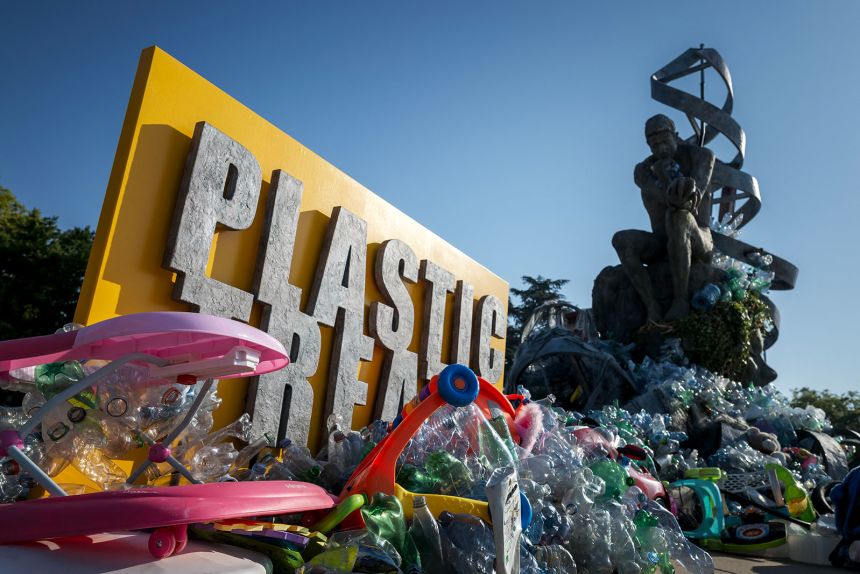
Geneva Meet – Talks on Global Plastics Treaty Resume
Introduction
Plastic pollution has become one of the most pressing global environmental crises. With production increasing exponentially since the mid-20th century, the world now faces the daunting challenge of managing plastic waste, which pollutes land, rivers, and oceans. Scientists warn that unchecked plastic production threatens biodiversity, human health, and sustainable development.
In this context, over 190 countries have convened in Geneva, Switzerland, in August 2025 to resume negotiations on the first-ever legally binding Global Plastics Treaty. The treaty, if successfully concluded, is expected to be the most important environmental agreement since the Paris Climate Agreement (2015).
For CLAT Current Affairs 2026, this issue is extremely significant as it highlights the intersection of international law, environmental governance, sustainable development, and global cooperation. Aspirants preparing with the best online coaching for CLAT or through online coaching for CLAT must study this development carefully, as it may directly feature in legal reasoning passages, current affairs sections, or essay topics.
Why in News?
- The fifth session of the Intergovernmental Negotiating Committee (INC-5) on plastics is being held in Geneva.
- Negotiations had collapsed in Busan, South Korea (December 2024) due to disagreements on critical issues.
- Countries are now attempting to break the impasse and finalize a Global Plastics Treaty.
- The treaty aims to tackle plastic pollution from production to disposal and recycling, making it comprehensive in scope.
- If adopted, it could represent a once-in-a-generation opportunity to create a binding global framework against plastic pollution.
Point-wise Summary of the Article
- Background of the Treaty
- In 2022 (Nairobi), the UN Environment Assembly adopted a resolution to draft a legally binding global plastics treaty.
- Negotiations have been ongoing under the Intergovernmental Negotiating Committee (INC).
- Current round (Geneva) is the fifth session (INC-5).
- Key Objectives of the Treaty
- To end plastic pollution globally.
- To address pollution from production, usage, and disposal stages.
- To regulate harmful chemicals used in plastics.
- To promote sustainable recycling and waste management systems.
- Challenges in Negotiations
- Disagreements remain over:
- Cap on plastic production.
- Elimination of toxic polymers and additives.
- Control over hazardous plastic waste.
- Draft text currently contains 3,000 brackets, showing areas of disagreement.
- Global Plastic Crisis – Statistics
- Plastic production doubled from 234 million tonnes (2000) to 460 million tonnes (2019).
- Plastic waste increased from 156 million tonnes (2000) to 353 million tonnes (2019).
- According to OECD, production may triple by 2060 if no action is taken.
- Health and environmental costs of plastic pollution = $1.5 trillion annually.
- Health & Environmental Risks
- Plastics cause disease and death in humans, animals, and ecosystems.
- Microplastics enter food chains and affect marine and terrestrial life.
- Toxic chemicals used in plastics contaminate soil and water.
- Significance of the Treaty
- If successful, it will be the largest multilateral environmental treaty since the Paris Agreement (2015).
- It will bind nations to take significant measures to reduce plastic use and waste.
- It may also establish global monitoring, accountability, and compliance mechanisms.
- Civil Society & Campaigners’ Views
- Activists describe the negotiations as a “once-in-a-lifetime opportunity” to combat plastic pollution.
- They argue the treaty must not only regulate but also phase out single-use plastics.
Global Context
- Paris Agreement (2015): Landmark climate accord; the plastics treaty may become its equivalent for pollution.
- Basel Convention: Already regulates transboundary movement of hazardous wastes, including some plastics.
- Stockholm Convention: Controls persistent organic pollutants, relevant to harmful plastic additives.
- The new treaty would fill gaps by providing a comprehensive and binding international framework.
Notes on Peculiar Terms
- Global Plastics Treaty – A proposed international legally binding agreement to combat plastic pollution.
- Intergovernmental Negotiating Committee (INC) – UN body set up to draft the plastics treaty.
- Single-use Plastics – Disposable plastics used once (e.g., straws, bags, cutlery) before being discarded.
- Polymers – Basic chemical compounds that form plastics. Some polymers are toxic and non-biodegradable.
- Brackets in Negotiation Drafts – Text placed in brackets indicates lack of consensus among negotiators.
- Microplastics – Tiny plastic particles that result from the breakdown of larger plastics; they contaminate ecosystems and food chains.
- Paris Climate Agreement (2015) – Global pact on climate change mitigation; often compared with the plastics treaty for significance.
Legal and Environmental Implications
- International Law
- The treaty would create legally binding obligations for nations.
- It may require domestic law changes for compliance.
- Constitutional Relevance (India)
- Article 21 (Right to Life) has been interpreted to include the right to a clean environment.
- Article 48A: Directive Principle urging state to protect and improve the environment.
- Article 51(c): Promotes respect for international law and treaty obligations.
- Environmental Governance
- Encourages circular economy and sustainable production practices.
- Promotes international cooperation in waste management and innovation in alternatives to plastics.
- Economic Impact
- Industries dependent on plastics may face stricter regulation.
- New opportunities in bioplastics, eco-friendly packaging, and recycling sectors.
Conclusion
The Geneva talks on the Global Plastics Treaty mark a historic step in addressing one of the gravest environmental challenges of our time. With production and waste levels skyrocketing, the treaty has the potential to reshape international environmental law and policy.
However, success will depend on global cooperation, willingness to compromise, and balancing economic and environmental interests. For India, and indeed for the world, this treaty represents not just an environmental obligation but also an opportunity to lead in sustainable development.
For CLAT Current Affairs 2026, this issue is vital because it demonstrates how international law, domestic constitutional principles, and environmental policy converge. At CLAT Gurukul, the best online coaching for CLAT, we ensure that students preparing through online coaching for CLAT understand these global developments in depth, preparing them for both exam success and informed citizenship.
This Blog is Powered by CLAT Gurukul — India’s Leading Law Entrance Prep Platform
At CLAT Gurukul, we believe in empowering future legal minds with the right blend of knowledge, strategy, and mentorship. This blog is a reflection of our commitment to quality content that not only helps aspirants stay updated but also sharpens their conceptual clarity.
Why CLAT Gurukul?
- Personalized Mentorship by Top Legal Educators
- Comprehensive Study Materials & Legal Updates
- Daily Practice Sets, Mocks & Performance Tracking
- Result-Oriented Strategy for CLAT, AILET, and CUET
Whether you’re reading this article to deepen your understanding or to stay ahead in your exam prep — you’re already one step closer with CLAT Gurukul by your side.
Join thousands of successful aspirants who trusted CLAT Gurukul and cracked India’s top law entrance exams.
Visit https://www.youtube.com/@CLATGurukul/shorts to learn more or speak to our experts now!
Note from CLAT Gurukul
At CLAT Gurukul, we are committed to providing free CLAT study material, including CLAT current affairs, legal reasoning practice sets, general knowledge updates, logical reasoning questions, English comprehension exercises, and more — all curated by top mentors.
Our blog section is regularly updated with high-quality CLAT content tailored to match the evolving pattern of the CLAT UG exam. Whether you’re looking for CLAT 2026 current affairs, CLAT legal reasoning passages, or mock practice sets, we have you covered.
We believe in open-access learning and will continue to publish free CLAT preparation resources to help serious aspirants succeed.
Explore more free content under categories like:
Best online coaching for CLAT, CLAT current affairs, CLAT GK updates, CLAT legal updates, CLAT logical reasoning, and CLAT English preparation.
For structured learning, daily mocks, and expert mentorship, visit https://www.youtube.com/@CLATGurukul/shorts — the Best CLAT Coaching in Patna and India’s most trusted platform for CLAT online coaching.




